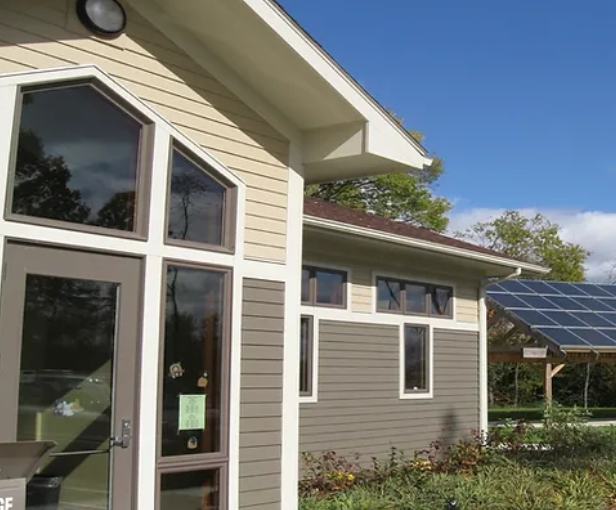Podcast: Play in new window | Download (Duration: 28:58 — 39.8MB)
Subscribe: RSS
Later, in today’s news feature, Environmental Correspondent Zyro Roze asks local eco architect and sustainability pioneer Bill Brown about the environmental considerations involved in constructing energy efficient public libraries that Brown designed for two communities in Indiana.
And now for your environmental reports:
In an IU news release, the university announced a new program to build on its legacy of helping its students and alumni contribute to efforts to find solutions to pressing global challenges. The Indiana University Kelley School of Business is establishing the Institute for Environmental and Social Sustainability.
Nearly 45 professors representing every department at the Kelley School in Bloomington and Indianapolis are actively engaged in research involving environmental and social sustainability. The institute will enable the school to better support and broaden these activities while also offering new courses and educational opportunities for students.
(quote) Many companies are increasingly addressing environmental and sustainability issues to better understand the impact of their activity on people and society, (end quote) said Ash Soni, dean of the Kelley School. The faculty has been engaged in these issues for a while, and this institute will help us to be better positioned to make a difference.
For example, enrollment in an undergraduate course on sustainability law and policy has tripled since 2017. New courses in climate law and policy are now offered. Another course on business and poverty alleviation have been introduced in recent years, and more new courses are under development. Kelley also offers a co-major in sustainable business at the undergraduate level.
Thus far, the state government has not interfered with the program. Earlier this year, the Attorney General filed suit to prevent investment of state pension funds into accounts that value social or environmental responsibility.
—Norm Holy
Inside Climate Change reports Congress is once again fighting over the nation’s debt ceiling, the legal limit on how much the United States can borrow. It’s a highly politicized battle that has threatened to paralyze the federal government almost every year for the past decade, with potentially significant long-term consequences for the U.S. economy. Now Republicans want to use it to repeal President Joe Biden’s climate agenda.
House Speaker Kevin McCarthy, who has become beholden to a handful of far-right GOP lawmakers, is on a quest to slash federal spending. The California Republican reluctantly agreed to raise the nation’s debt ceiling by $1.5 trillion for about a year, but not without demanding major concessions from Democrats.
McCarthy’s bill, called the Limit, Save, Grow Act of 2023, would slash more than $4.5 trillion from future federal spending by limiting discretionary funds, eliminating Biden’s student loan forgiveness plan and cutting financial commitments meant to revamp the Internal Revenue Service in order to prevent audits of the tax forms of the ultra-rich. It also targets the foundational provisions of the Inflation Reduction Act, the Democrats’ marquee climate law that passed last year.
That bill dedicates around $370 billion to fighting climate change, largely through tax rebates and other government credits that incentivize consumers and businesses to adopt clean energy technologies and electric vehicles. McCarthy’s proposal would repeal the vast majority of those. They include the tax credits for EVs, clean hydrogen, sustainable aviation fuel and even the credits that would reward energy providers for building more solar and wind power systems—even more so if they build them in low-income neighborhoods. Basically, McCarthy wants to say climate change is no threat to life on Earth.
McCarthy also slipped the Republican’s energy plan, known as H.R. 1, into his debt ceiling bill. That measure, which passed the House mostly along party lines last month, would speed up the federal approval of energy projects, bolster domestic oil and gas production and limit the ability of states to reject energy projects.
The Limit, Save, Grow Act (quote) would end the green giveaways for companies that distort the market and waste taxpayer money, (end quote) McCarthy said, speaking from the House floor on Wednesday. Goldman Sachs says the savings from ending these green giveaways are as much as $1.2 trillion. What McCarthy essentially prefers is to leave the cost of much of Florida and many other places going under water to future generations.
Despite protests from the State of Texas, the federal government has listed as endangered a rare milkweed plant that monarch butterflies thrive on and is designating miles of critical habitat on the South Texas border that could affect future state border wall development.
The prostrate milkweed only grows within 9 miles of the border in the United States. The plant is integral to the survival of monarch butterflies. In July, the monarchs were listed as threatened species.
Monarch butterflies migrate to this area across the Rio Grande Valley, between Mexico United States every year. So listing the prostrate milkweed on the endangered species list was the right decision.
In the spring, female monarchs will migrate north across the borderlands, and they have to find milkweed to lay eggs on where they die. The prostrate milkweeds are the first species that they’ll come across. The female can lay their eggs on the milkweed and then they die; the new butterflies that emerge from this will continue the migration to points further north. So these really are critically important flowers, and make the entire butterfly migration process possible.
Those pesky squirrels! How do they do it? How can they possibly get to your bird feeder when you have a baffle to keep them out?
Squirrels can sprint along fences; skitter up, down, and around tree trunks; and pull off awe-inspiring feats of agility – like getting into your bird feeder.
Their anatomy is specialized for treetop antics. They have hyperflexible back ankles that can rotate a full 180 degrees, plus they have curved claws. So, by reversing their ankles, they can dig their back claws into a tree’s bark even while descending headfirst.
It’s a rare talent. House cats which are in the same genus, can’t twist their ankles. That’s why cats can’t back down a tree.
lSQuirrels legs are also strong. They can leap more than six feet. The average squirrel is under a foot long, yet they can leap over six times the length of their body.
Squirrels also learn by trial and error. They will keep trying over and over until they figure it out. That’s why they finally figure out how to get into your bird feeder, no matter what you do.
—Julianna Dailey
The Environmental Protection Agency as soon as this week is expected to unveil standards for new and existing power plants, which belch roughly a quarter of U.S. greenhouse gas emissions, two sources said. The rules will replace former President Donald Trump’s American Clean Energy rule and former President Barack Obama’s Clean Power Plan, both of which were invalidated by courts.
More than a year in the making, the standards should be based on a plant’s potential to reduce emissions through carbon capture and storage technology, according to clean air law experts and industry representatives in talks with the EPA.
Utility companies may need to decide whether they want to build new gas plants with carbon capture technology or zero-emission renewable energy. States would develop plans for bringing their plants into compliance.
Most new gas plants currently do not pay for emitting carbon, so the rules could make it harder for them to compete with solar and wind power. Gas plus carbon capture would always be more expensive than solar or wind.
Biden has pledged that the power business will decarbonize by 2035. According to the Clean Air Act, the standards must be based on “best system of emission reduction,” technologies deemed affordable and technically feasible.
The proposal will reflect two major developments to ensure the rules are legally defensible. One, a Supreme Court decision last July, barred EPA from forcing a system-wide shift in electric generation but allowed it to issue plant-specific rules.
Second, the Inflation Reduction Act created tax credits making carbon capture and hydrogen more affordable and affirmed EPA’s authority to regulate power plants. The law offers more than $100 billion in clean electricity tax incentives, including a 70% increase in credits for each ton of carbon captured and sequestered. This program is in the Inflation Reduction Act because the fossil fuel industries see it as a way to continue burning fossil fuels.
If you’re building a new fossil plant, it needs to control its emissions, said Lissa Lynch, director of the federal legal group at the Natural Resources Defense Council. Existing technology can capture and store approximately 90% of carbon emissions, Lynch said.
—Norm Holy
Feature Report:

And now we go to Zyro Roze and the first part of an interview with Bill Brown of I.U.’s Environmental Resilience Institute on how he harnessed social capital, federal funds and the energy of the Sun to create America’s first certified Energy Positive public library right here in Indiana.


And now for some upcoming events:
- A Morel Mushroom Festival is scheduled at Brown County State Park on Saturday, May 6th, from 10 am to 5 pm. Enjoy a full day of mushroom activities, including classes on how to find morel mushrooms; off-trail hiking to search for morel mushrooms; mushroom arts and crafts and much more.
- Join volunteer Steve for a Wildflower Hike at Spring Mill State Park on Saturday, May 6th, from 3 to 4 pm. You will hike on Trail 5 while exploring all the wildflowers in bloom. This is a moderate, one-mile hike. Meet at the Lakeview Activity Center.
- A gardening class on Healthy Soil, Healthy Garden is taking place on Wednesday, May 10th, from 5:30 to 7 pm at the Butler Community Park Gardens. Learn about the importance of healthy soils, how to improve your soil and how to test it. Register at bloomington.IN.gov/parks.
- Brown County State Park is hosting a Snake Meet and Greet on Thursday, May 11th, from 4 to 4:30 pm. Go to the Nature Center for an up close and personal look at one of Indiana’s native snakes. Learn about their unique traits, the threats they face and how you can protect them.
- Hike Trail 5 for an A to Z Lake Hike at Spring Mill State Park on Saturday, May 13th, from 10 to 11 am. As you hike around the lake, you will search for all things from A to Z. It will be amazing what you will find. Meet at the Lakeview Activity Center.
Credits:
This week’s headlines were written by Norm Holy and Julianna Dailey.
Today’s news feature was produced by Zyro Roze and edited by Kade Young.
Julianna Dailey assembled the script and was edited by Zyro Roze.
Julianna Dailey compiled our events calendar.
Noelle Herhusky-Schneider and Branden Blewett produced and engineered today’s show.
 WFHB Bloomington Community Radio
WFHB Bloomington Community Radio


